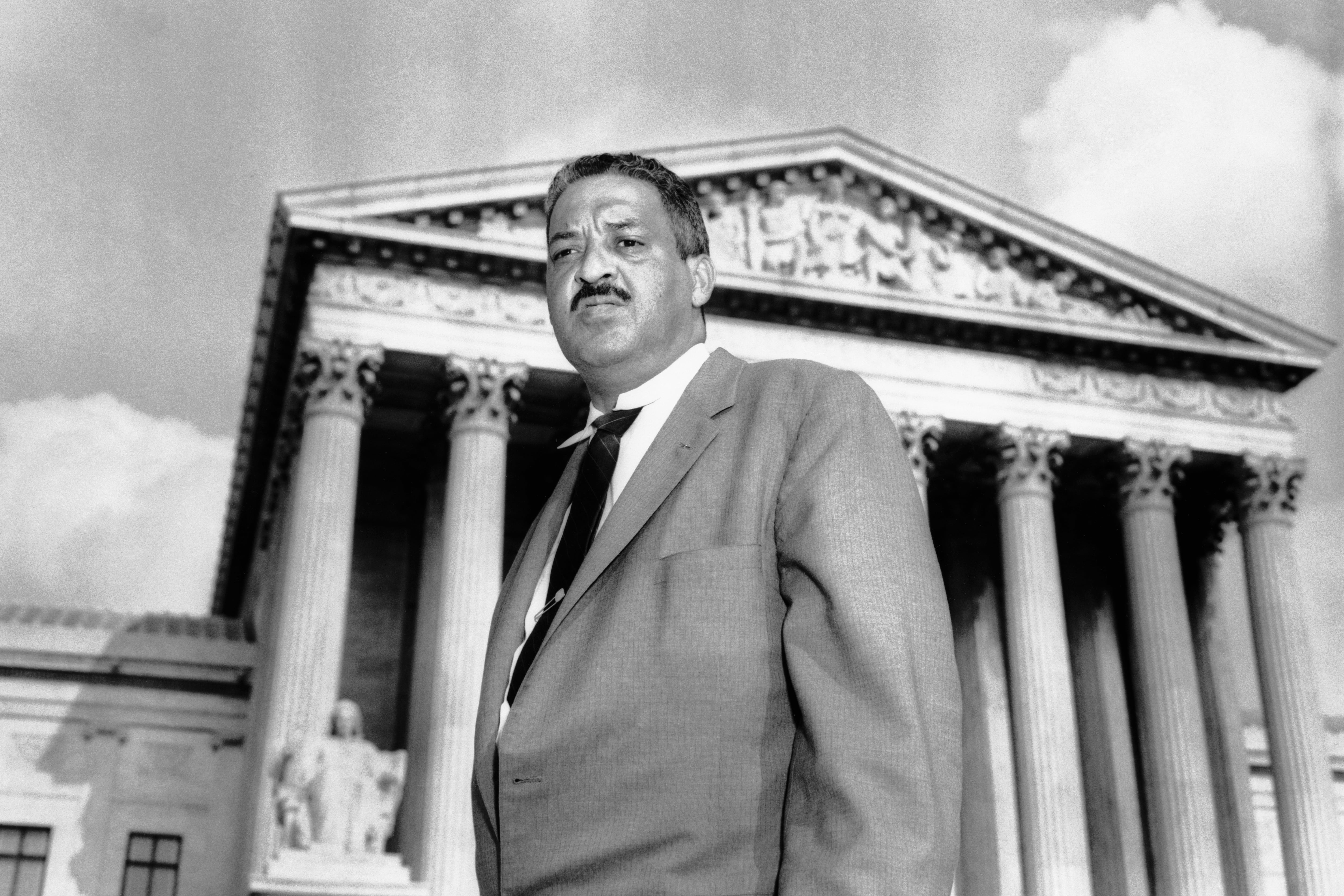In the months leading up to the landmark Brown v. Board of Education of Topeka decision — 70 years ago this month — Thurgood Marshall, arguing before the U.S. Supreme Court, successfully challenged racial segregation in public schools. Then the NAACP’s chief legal counsel, Marshall would go on to become the nation’s first Black Supreme Court Justice. His December 8, 1953 remarks before the high court are below. Chalkbeat has added links for context.
It follows that with education, this Court has made segregation and inequality equivalent concepts. They have equal rating, equal footing, and if segregation thus necessarily imports inequality, it makes no great difference whether we say that the Negro is wronged because he is segregated, or that he is wronged because he received unequal treatment…
I would like to say that each lawyer on the other side has made it clear as to what the position of the state was on this, and it would be all right possibly but for the fact that this is so crucial. There is no way you can repay lost school years.
These children in these cases are guaranteed by the states some 12 years of education in varying degrees, and this idea, if I understand it, to leave it to the states until they work it out — and I think that is a most ingenious argument — you leave it to the states, they say, and then they say that the states haven’t done anything about it in a hundred years, so for that reason this Court doesn’t touch it.
The argument of judicial restraint has no application in this case. There is a relationship between federal and state, but there is no corollary or relationship as to the Fourteenth Amendment.
The duty of enforcing, the duty of following the Fourteenth Amendment, is placed upon the states. The duty of enforcing the Fourteenth Amendment is placed upon this Court, and the argument that they make over and over again to my mind is the same type of argument they charge us with making, the same argument Charles Sumner made. Possibly so.
And we hereby charge them with making the same argument that was made before the Civil War, the same argument that was made during the period between the ratification of the Fourteenth Amendment and the Plessy v. Ferguson case.
And I think it makes no progress for us to find out who made what argument. It is our position that whether or not you base this case solely on the Intent of Congress or whether you base it on the logical extension of the doctrine as set forth in the McLaurin case, on either basis the same conclusion is required, which is that this Court makes it clear to all of these states that in administering their governmental functions, at least those that are vital not to the life of the state alone, not to the country alone, but vital to the world in general, that little pet feelings of race, little pet feelings of custom — I got the feeling on hearing the discussion yesterday that when you put a white child in a school with a whole lot of colored children, the child would fall apart or something. Everybody knows that is not true.
Those same kids in Virginia and South Carolina — and I have seen them do it — they play in the streets together, they play on their farms together, they go down the road together, they separate to go to school, they come out of school and play ball together. They have to be separated in school.
There is some magic to it. You can have them voting together, you can have them not restricted because of law in the houses they live in. You can have them going to the same state university and the same college, but if they go to elementary and high school, the world will fall apart. And it is the exact same argument that has been made to this Court over and over again, and we submit that when they charge us with making a legislative argument, it is in truth they who are making the legislative argument.
They can’t take race out of this case. From the day this case was filed until this moment, nobody has in any form or fashion, despite the fact I made it clear in the opening argument that I was relying on it, done anything to distinguish this statute from the Black Codes, which they must admit, because nobody can dispute, say anything anybody wants to say, one way or the other, the Fourteenth Amendment was intended to deprive the states of power to enforce Black Codes or anything else like it.
We charge that they are Black Codes. They obviously are Black Codes if you read them. They haven’t denied that they are Black Codes, so if the Court wants to very narrowly decide this case, they can decide it on that point.
So whichever way it is done, the only way that this Court can decide this case in opposition to our position, is that there must be some reason which gives the state the right to make a classification that they can make in regard to nothing else in regard to Negroes, and we submit the only way to arrive at that decision is to find that for some reason Negroes are inferior to all other human beings.
Nobody will stand in the Court and urge that, and in order to arrive at the decision that they want us to arrive at, there would have to be some recognition of a reason why of all of the multitudinous groups of people in this country you have to single out Negroes and give them this separate treatment.
It can’t be because of slavery in the past, because there are very few groups in this country that haven’t had slavery some place back in history of their groups. It can’t be color because there are Negroes as white as the drifted snow, with blue eyes, and they are just as segregated as the colored man.
The only thing can be is an inherent determination that the people who were formerly in slavery, regardless of anything else, shall be kept as near that stage as is possible, and now is the time, we submit, that this Court should make it clear that that is not what our Constitution stands for.
Thank you, sir.







